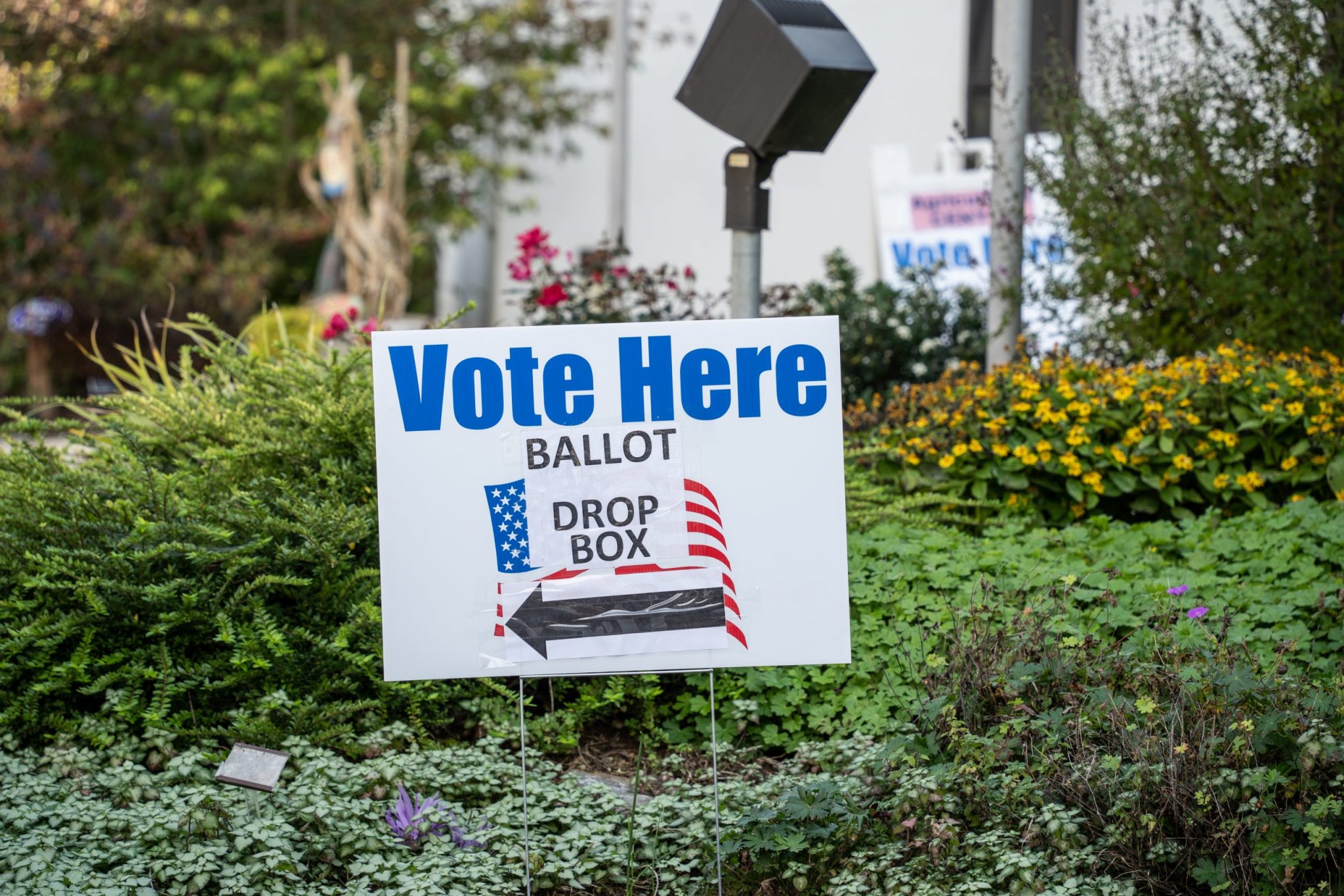The Midterm Monitor is an interactive tool that provides a snapshot of social media messages and narratives shaping the conversation around voting and election administration in the leadup to the 2022 midterm elections. The Midterm Monitor tracks social media posts for a subset of candidates for office, news outlets, and other key messengers. Learn more.
This week, the Midterm Monitor Report reviews data from secretary of state accounts followed on the monitor, and dives into the battleground states of Wisconsin and Pennsylvania. A few takeaways:
- Secretary of state candidates: While it’s clear election denialism among secretary of state candidates drives engagement, the vast majority of tweets containing potential mis- or disinformation keywords from secretary of state candidates—from both parties—were aimed at counteracting false narratives of widespread fraud.
- Wisconsin: Although political issues like abortion and crime dominated election-related coverage by word count, four of the five most retweeted election-related tweets from local media outlets during the studied 30-day period focused on election fraud. According to Brennan Center analysis, local media Twitter accounts in Wisconsin had the second highest word count for mentions of “fraud” behind Florida and the highest incidence for “decertification” and “election fraud”—despite having significantly fewer outlets and total Twitter posts compared to local media being monitored in states like Florida and Texas.
- Pennsylvania: An analysis of links shared by Pennsylvania candidates found that Republicans and Democrats shared articles from largely—though not entirely—different information sources. For both Democrat and Republican candidates, the two most shared local news sites were the Philadelphia Inquirer and the Pittsburgh Post-Gazette. Among national media outlets, Fox News was the only domain among the top ten most shared domains by both Republicans and Democrats.
A Closer Look: Secretary of State Races
Election Denialism is Driving Engagement on Social Media for Secretary of State Candidates
Over a 30-day period between August 29 and September 27, the four most retweeted secretary of state candidate accounts on Twitter were either affiliated with candidates who the non-partisan States United Democracy Center has identified as election deniers, or their opponents. Perhaps not coincidentally, the two most retweeted secretary of state candidate accounts belonged to the Republican candidate for office in Arizona, Mark Finchem, an outspoken election denier, and his Democratic counterpart, Adrian Fontes. Finchem also had the largest numeric gain in followers during the studied 30-day period. On Facebook, four of the five secretary of state candidate pages with the most reactions over the same period were from election deniers or their opponents. Three of the top five pages with the most reactions were affiliated with election deniers, led again by Finchem but also including podcaster, Qanon supporter, and Ohio Independent candidate Terpsehore “Tore” Maras.
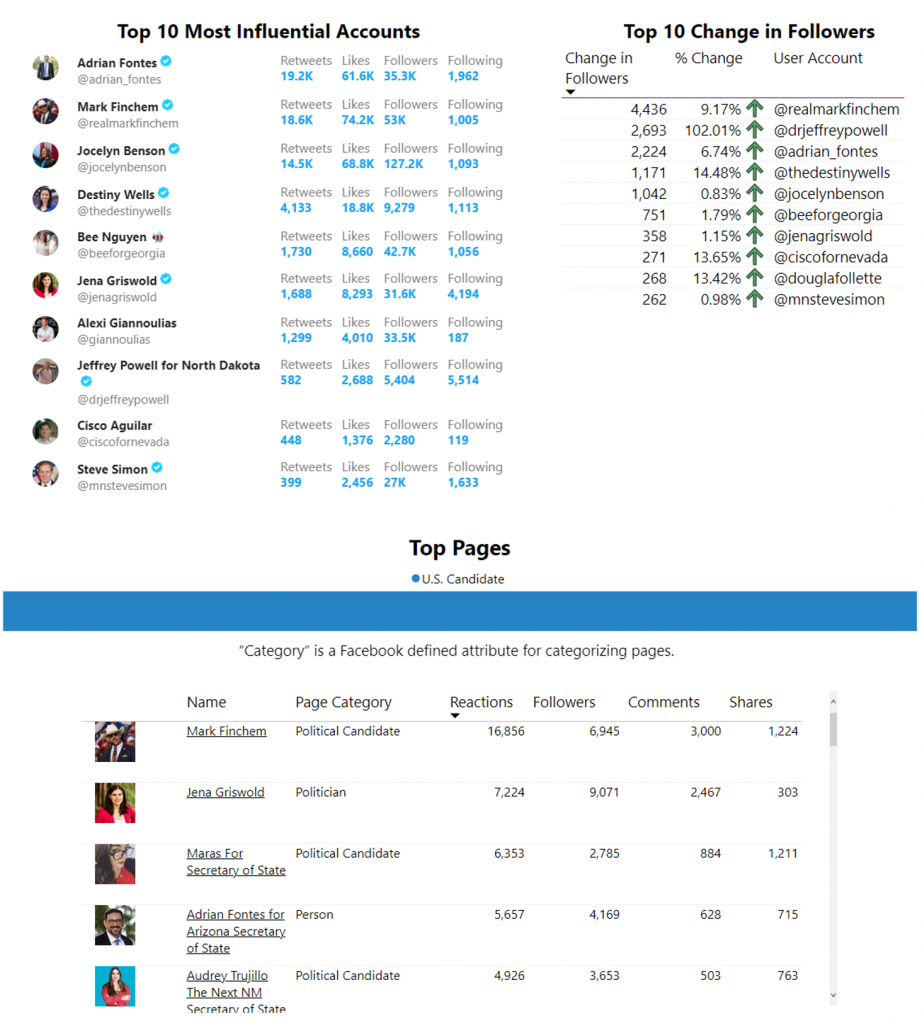
The most influential Twitter accounts and Facebook pages affiliated with candidates for secretary of state, rank ordered, respectively, by retweets and reactions between August 29 and September 27, 2022.
Among Republican secretary of state candidates, six of the ten most retweeted Twitter accounts belonged to those identified by States United as election deniers, though those candidates—other than Finchem—did not receive significant engagement on Twitter. On Facebook, all five Republican secretary of state candidate pages with the most reactions were affiliated with election deniers.
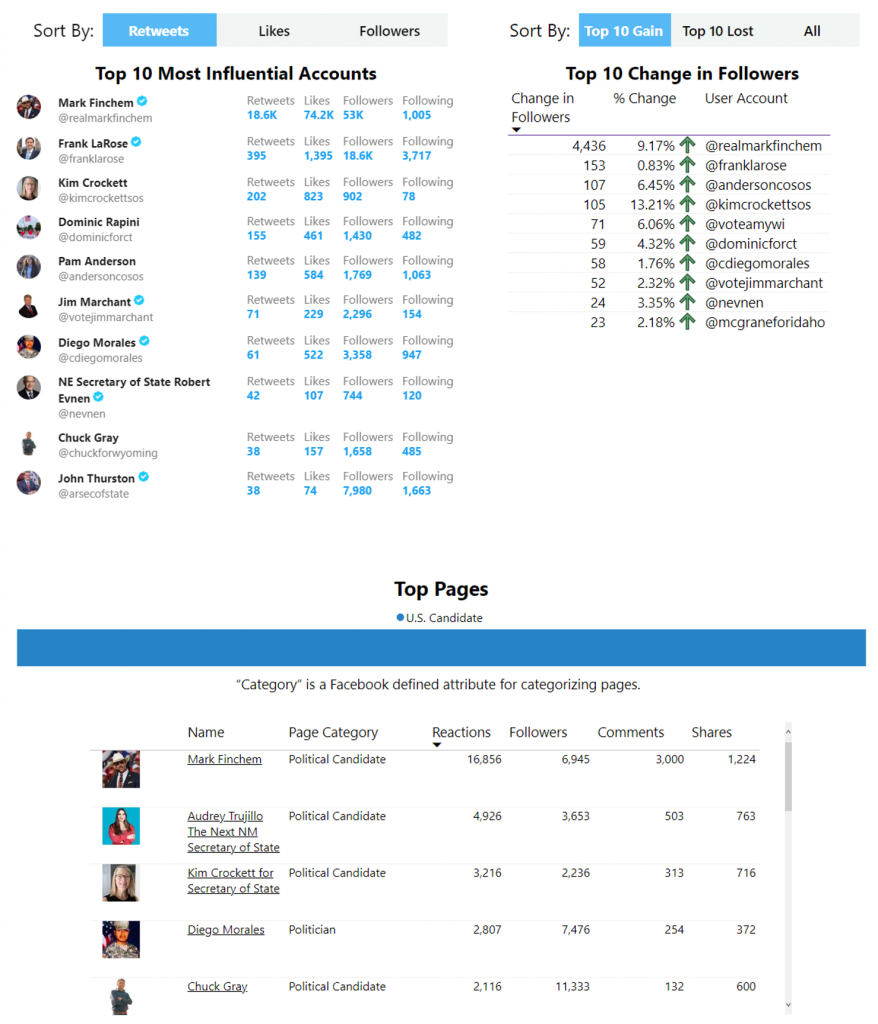
The most influential Twitter accounts and Facebook pages affiliated with Republican candidates for secretary of state, rank ordered, respectively, by retweets and reactions between August 29 and September 27, 2022.
Finchem also had all ten of the most retweeted tweets among Republican secretary of state candidates, at least four of which directly questioned the validity of the 2020 election or cast doubt on the Election Registration Information Center (ERIC), which more than 30 states use to improve the accuracy of voter rolls. The ERIC system was also questioned by Minnesota secretary of state candidate Kim Crockett, who shared an article that misleadingly claimed that “Democratic operatives control voter rolls in 31 states.”
Secretary of State Election Denier Candidates Regularly Undermined Trust in Elections
A team of analysts at the Brennan Center hand coded 296 tweets posted by secretary of state candidates between mid-August and mid-September for 37 different false narratives related to election administration. These false narratives are based on key narratives perpetuated ahead of and after the 2020 election. The list was compiled by the Brennan Center team. This list is not expansive, but it forms a basis for identifying overall trends in promotion of false narratives. More than 11 percent of the tweets coded promoted one of these false narratives related to the US elections. More than 94 percent of those posts were shared by candidates who States United identified as election deniers. Just one post questioning the reliability of elections was shared by an individual not classified as an election denier, and another was shared by a candidate with such a small following that States United has not classified him one way or another. The positive takeaway is that the vast majority of tweets containing potential mis- or disinformation narratives from secretary of state candidates—from both parties—were aimed at counteracting false narratives of widespread fraud.
Battleground State Deep Dive: Wisconsin
Each week, we’ll take a closer look at the key influencers and narratives in one of our ten battleground states. This week, we look at two as we turn to Wisconsin and Pennsylvania.
Most Influential Candidates on Social Media
Democrats outperformed their Republican counterparts on Twitter between August 29 and September 27, 2022, with the three most retweeted accounts—by a significant margin—belonging to Democratic candidates for the Senate, House, and governor. On Facebook, however, three of the top five pages with the most reactions were affiliated with Republicans.
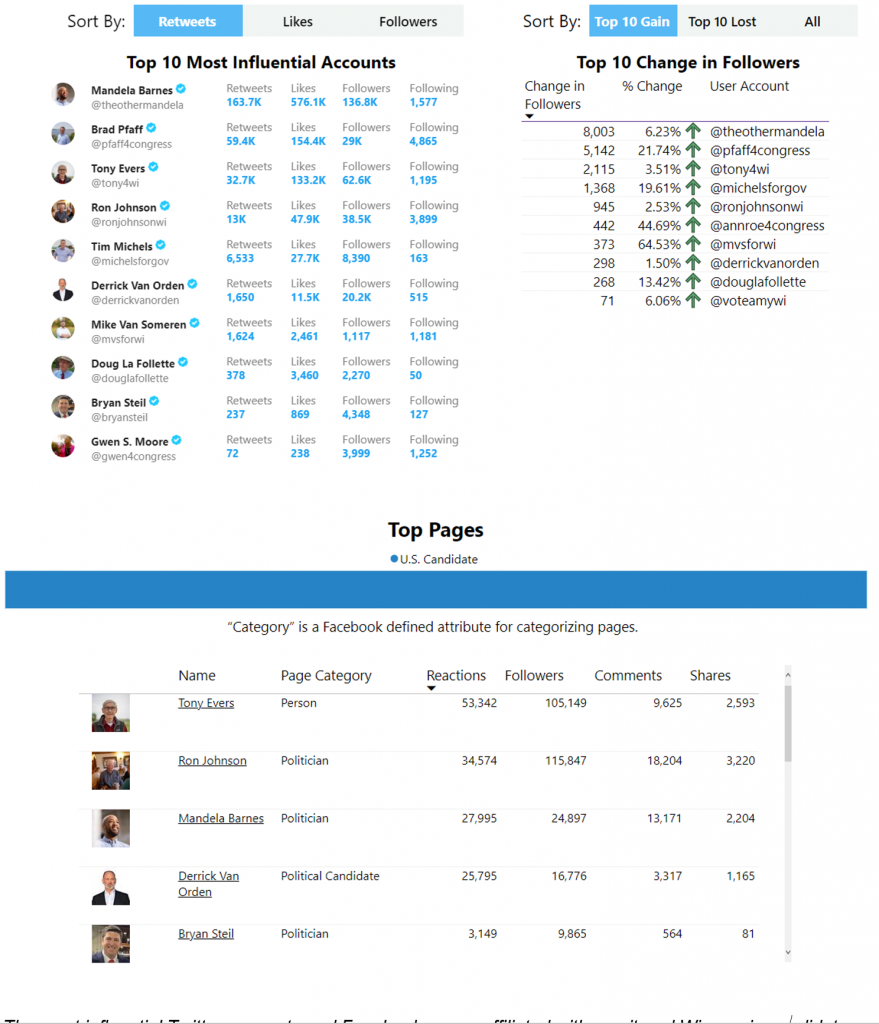
The most influential Twitter accounts and Facebook pages affiliated with monitored Wisconsin candidates for the US House, Senate, secretary of state, and governor rank ordered, respectively, by retweets and reactions between August 29 and September 27, 2022.
Election Topics in Local Media Coverage
In total, monitored local media accounts in Wisconsin posted 739 election-related tweets between August 29 and September 27, 2022. Although political issues like abortion and crime dominated election-related coverage by word count, four of the five most retweeted election-related tweets from local media outlets during the studied 30-day period focused on election fraud. The top story was the arrest of Wisconsinite Harry Wait for illegally requesting absentee ballots using the names of prominent Wisconsin politicians in an attempt to cast doubt on the security of Wisconsin’s election system. Wisconsin has several security layers to prevent an illegally acquired ballot from being counted, including ensuring that if the real voter applies for a ballot or shows up in person, the illegally acquired ballot would be voided. In such circumstances, election clerks are required to notify law enforcement. Unauthorized use of personal information to illegally obtain mail ballots is a felony punishable by prison time and fines. The news was the subject of at least 70 local media tweets—it received some, but significantly less, national media coverage.
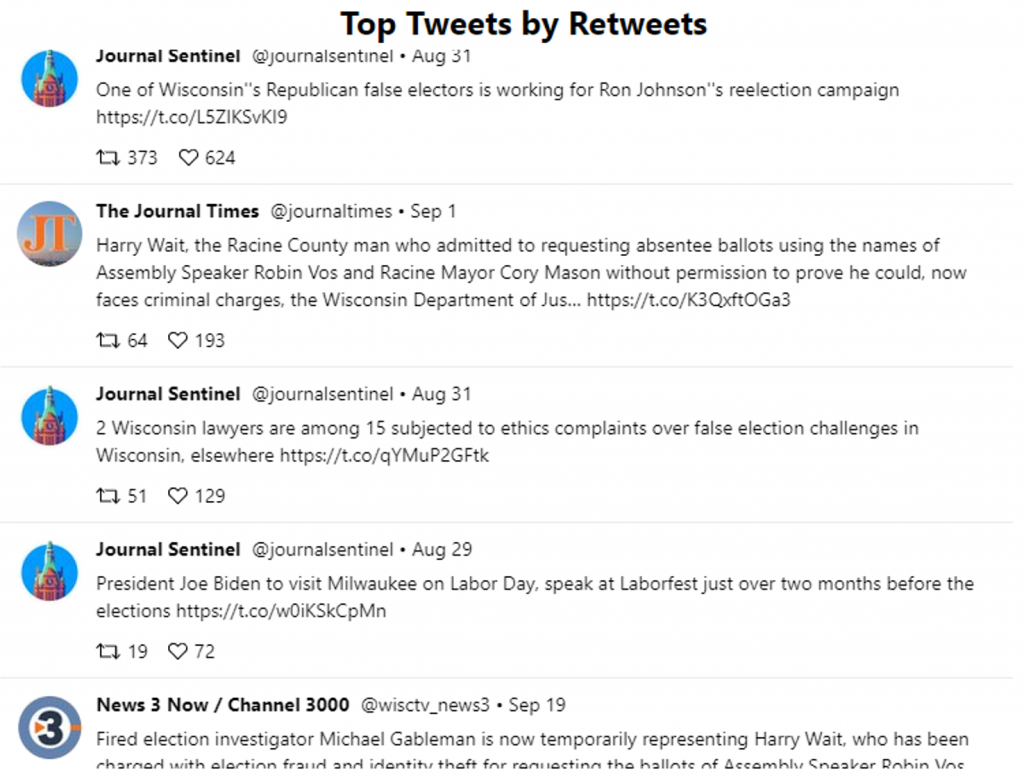
Most retweeted election-related tweets from monitored local media outlets in Wisconsin between August 29 and September 27, 2022.
Election Fraud and Decertification Has Been A Major Topic in Wisconsin
In a Brennan Center analysis of local media on Twitter in battleground states monitored on the dashboard between August 13 and September 13, 2022, local media Twitter accounts in Wisconsin had the second highest word count for mentions of “fraud” behind Florida and the highest incidence for “decertification” and “election fraud”—despite having significantly fewer outlets and total Twitter posts compared to local media being monitored in states like Florida and Texas. The period of time we are examining begins one day after Wisconsin Assembly Speaker Robin Vos ended a 14-month, $1.1 million taxpayer-funded investigation into the 2020 election that found no evidence of widespread fraud, and fired his hand-picked chief investigator Justice Michael Gableman, whom he called an “embarrassment.” Twenty percent of the tweets in Wisconsin featuring the word “fraud” mention either Vos or Gableman, underscoring the centrality of this story to the discussion of fraud in the state.
Shifting Absentee Voting Rulings Create Messaging Gaps around Rights of Disabled Voters
Under Wisconsin law, voters with a disability can give their absentee ballots to someone else to return if they require such assistance, but shifting rulings from a state and then federal court may have left voters confused. Recent activity on social media may have compounded that confusion.
In July, the Wisconsin Supreme Court issued a ruling that prohibited the use of most drop boxes for absentee ballots in the state and found that a voter can return their absentee ballot by mail or must personally deliver it. The court also found that voters returning absentee ballots in person can do so only for themselves and not for another voter. The ruling was widely covered both locally and nationally, with 155 tweets in the two weeks after the ruling from monitored media outlets mentioning “Wisconsin” and “supreme” in the same tweet (some were not relevant to the drop box decision). While local media outlets in Wisconsin provided extensive coverage of the ruling (at least 83 tweets), national media outlets and pundits were far more visible—all the top 20 most retweeted and liked posts about the ruling came from national sources. By far the most visible was conservative commentator and filmmaker Dinesh D’Souza, whose film “2000 mules” falsely claims to expose “widespread, coordinated voter fraud in the 2020 election.” D’Souza had seven of the top ten posts about the drop box ruling.
In late August, however, a federal judge in Wisconsin ruled that voters with disabilities can have someone else return their absentee ballots for them. That decision received far less media coverage than the drop box ruling, with only 32 mentions of “Wisconsin” and “disabled” or “disabilities” mentioned in the same tweet in the two weeks after the decision. Local media provided the bulk of the coverage, but in this case, there was extremely limited national media coverage (5 tweets)—all of it from ostensibly centrist or left-leaning outlets (and none from D’Souza). This could lead to confusion among Wisconsinites regarding the legality of certain forms of voting in the state, given our highly fragmented media environment.
Battleground State Deep Dive: Pennsylvania
Most Influential Candidates on Social Media
Candidates from the Keystone State ranked among the most influential monitored candidate accounts nationwide on social media in September. Thanks in large part to his television fame, Mehmet Oz, the Republican candidate for the US senate, has the most followers of any monitored candidate page nationwide on Facebook, and the third and sixth most followers, respectively, on Twitter and Instagram. In September, however, his opponent, Democrat John Fetterman, received the most likes and retweets of any monitored candidate in Pennsylvania on Twitter, and the most reactions of any monitored candidate pages on Facebook. Fetterman’s engagement totals on Twitter and Facebook placed him among the top five monitored candidate Twitter accounts and Facebook pages nationwide, a striking finding given that Fetterman was a relative political unknown prior to earning his party’s nomination in June. Josh Shapiro, the Democratic nominee for governor, received the second most retweets on Twitter and the third most likes of any monitored Pennsylvania candidates on Twitter, placing him among the top ten candidates nationwide. His Republican opponent, Doug Mastriano, had a fraction of Shapiro’s engagements on Twitter, but Mastriano received the second most reactions and the most shares of any monitored Pennsylvania candidate on Facebook. Shares of Mastriano’s Facebook posts ranked second among monitored nationwide candidates, placing him only behind Texas Republican Dan Crenshaw.
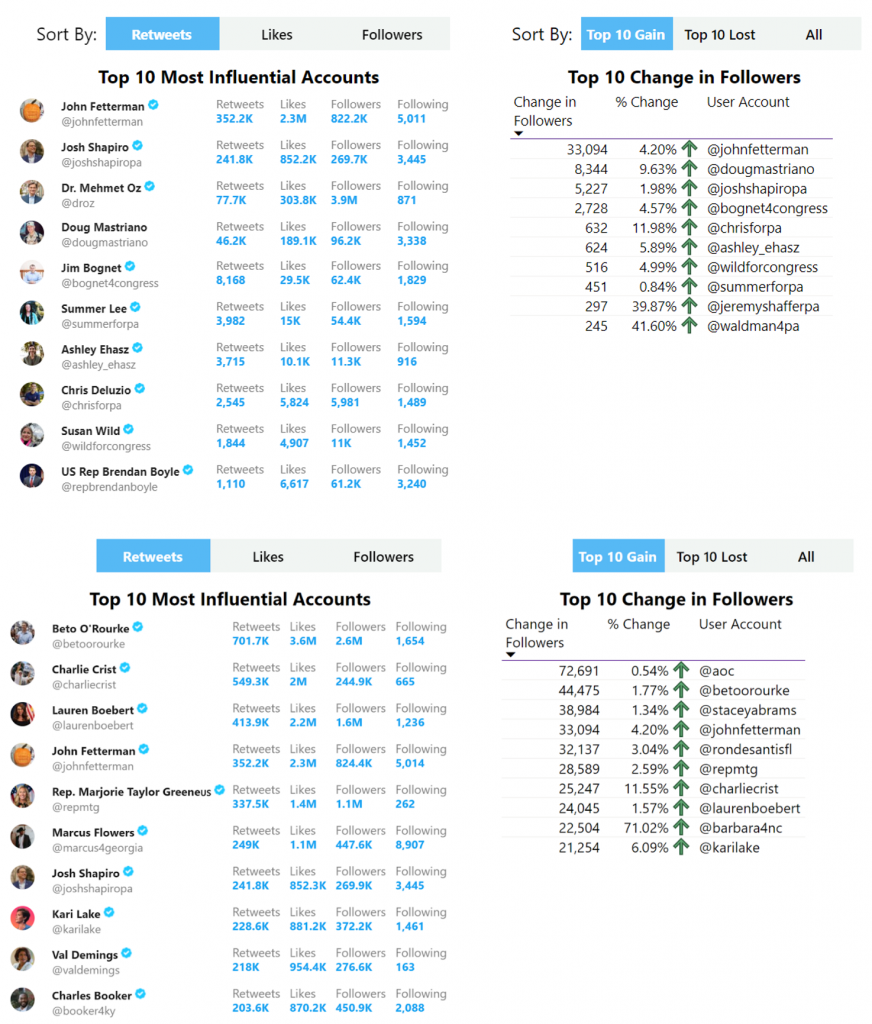
The most influential Twitter accounts affiliated with monitored candidates in Pennsylvania (top figures) and nationwide (bottom figures) in September 2022, rank ordered by retweets.

The most influential Facebook pages affiliated with monitored candidates in Pennsylvania (top figure) and nationwide (bottom figure) in September 2022, rank ordered by reactions.
Pennsylvania Senate Race Dominates Local and National Media Coverage
In September, local and national media provided far more coverage of the Senate race between Mehmet Oz and John Fetterman than any other Pennsylvania race, including the race for governor. Monitored local and national media outlets mentioned “Oz” in approximately 606 tweets and “Fetterman” in approximately 664 tweets in September. The Republican and Democratic candidates for governor received significantly less coverage, with Josh Shapiro mentioned in approximately 158 tweets and Doug Mastriano mentioned in approximately 237 tweets from monitored media accounts. (Individual tweets were not manually coded; therefore, there is the possibility that some occurrences were false positives, particularly for mentions of “Oz” and “Shapiro”).
Democratic Candidates Are Far More Likely to Mention Mastriano than Republicans
Doug Mastriano, whose involvement in the January 6 insurrection and mercurial campaign style have led some prominent Republicans to back his opponent, has received little support from fellow Republican candidates on Twitter. In September, only two GOP candidates mentioned Mastriano in tweets (Glenn Thompson and Aaron Bashir). By comparison, Mehmet Oz was mentioned by seven different GOP candidates, including Mastriano. Democrats were far more likely to mention Mastriano, with at least ten different monitored candidates from four different states mentioning him in September, suggesting Democrats are attempting to capitalize on Mastriano’s election denialism.
Few Conversations about Election Integrity from PA Candidates—Including Election Deniers
According to FiveThirtyEight’s tracker of election deniers, at least 18 monitored candidates in Pennsylvania have raised questions about the legitimacy of the 2020 election, with ten classified as having “fully denied” the result. Yet, conversations about election fraud and election integrity were largely absent from monitored candidates’ social media posts in September. Of the more than 1,800 tweets made by monitored candidates in September, none mentioned “election integrity” or “election fraud,” though Mastriano did post a tweet criticizing Democrats for “block[ing] investigations into the 2020 election.” In the same tweet, he also promised to get “rid of drop boxes” and implement “universal voter ID [laws].” Mastriano repeated those talking points in a Facebook post outlining his plans for “election integrity.” He also questioned the legitimacy of the 2020 election in a video posted to his YouTube channel. Despite the relative lack of promotion of election denialism narratives from the candidates themselves, election deniers—Mastriano in particular—engaged with several prominent—and not so prominent—accounts that have spread election-related conspiracy theories. In September, Mastriano retweeted conservative pundit and OANN host Jack Posobiec, who has been connected to the Pizzagate conspiracy theory, “stop the steal” movement, and French election interference, 66 times, making Posobiec by far the most retweeted account by monitored Pennsylvania candidates. The second most retweeted account by Mastriano was Jenna Ellis, the former Trump campaign lawyer who is now a senior advisor to Mastriano. Outside of Mastriano, write-in Libertarian candidate Caroline Avery made the unsupported claim that her opponent, Republican House candidate Brian Ftizpatrick, won the Republican nomination because “he has mules fill the ballots for him.” At least two Democratic candidates mentioned issues related to election integrity in Facebook posts in September—both of which criticized their opponents for promoting the “Big Lie” and false claims of widespread election fraud.
Analysis of Links Shared by Pennsylvania Candidates
Putting aside obvious differences between the links shared by Republicans and Democrats to their respective campaign or campaign donation websites, Republicans and Democrats shared articles from largely—though not entirely—different information sources. For both Democrat and Republican candidates, the two most shared local news sites were the Philadelphia Inquirer and the Pittsburgh Post-Gazette. Among national media outlets, Fox News was the only domain among the top ten most shared domains by both Republicans and, somewhat surprisingly, Democrats. (Though there was no overlap in the individual Fox News articles shared by candidates from the two major parties.) Also surprising was the appearance of the left-leaning Washington Post among the ten most shared domains by Republicans, but not Democrats. But information sources diverged from there, with Republican candidates in Pennsylvania sharing articles from conservative outlets like the Washington Examiner and Free Beacon and linking to videos on Rumble, a video sharing platform favored by conservatives. Pennsylvania Democrats, meanwhile, favored legacy media outlets like NBC and a local NPR affiliate.
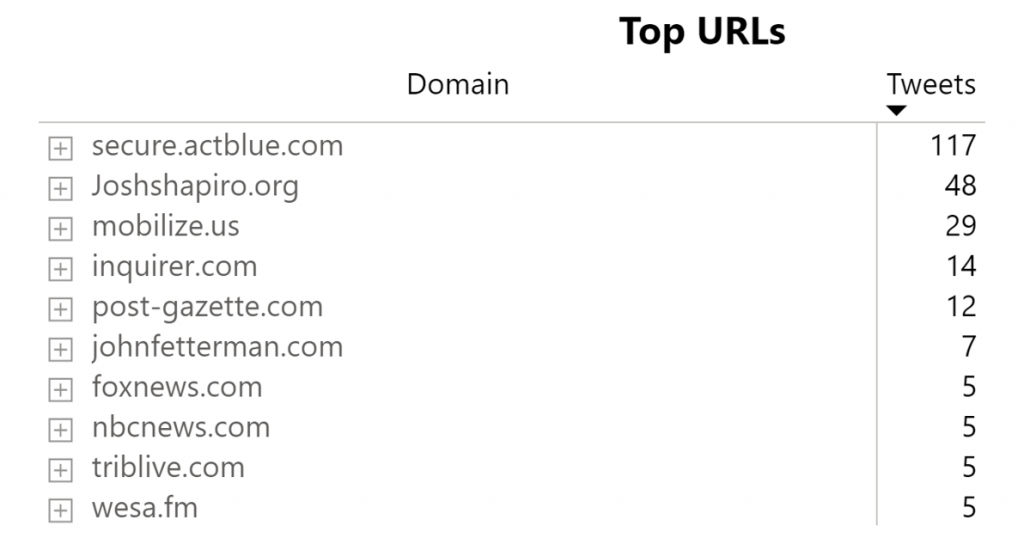
The most shared domains from monitored Pennsylvania Democratic candidates on Twitter in September 2022.
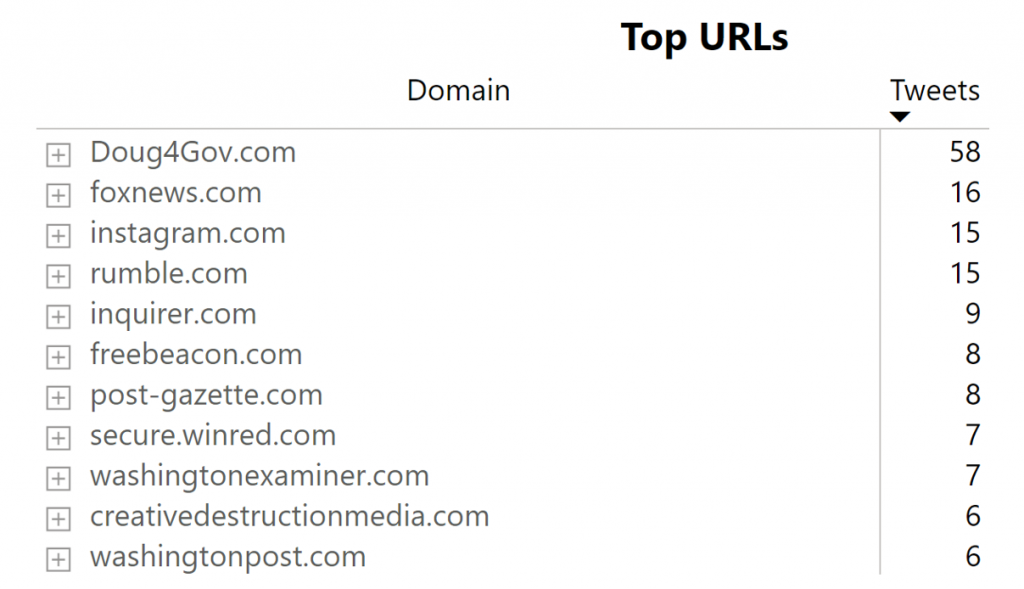
The most shared domains from monitored Pennsylvania Republican candidates on Twitter in September 2022.
Local Debate over Drop Boxes
In September, eight of the 13 mentions of drop boxes from monitored local news outlets on Twitter came from outlets located in Pennsylvania (the monitor tracks local news in ten battleground states), and six of the ten mentions of drop boxes from monitored national media outlets and pundits referenced the Keystone State. The most covered story was a lawsuit brought by The America First Legal Foundation—an advocacy group founded by former Trump administration officials Mark Meadows and Steven Miller. The Foundation sued Lehigh County, Pennsylvania on behalf of four residents in early September, claiming that election officials failed to put in place safeguards “to prevent the third-party delivery of mailed ballots to drop boxes.” Pennsylvania Election Code requires that mailed and absentee ballots be returned either by mail or in person by the person to whom the ballot belongs, except in cases where those with disabilities authorize a third-party to return their ballot for them. On the America First website, Miller stated that “the illegal drop box scheme in Lehigh County, Pennsylvania, violates state law—undermining the franchise for lawful citizen voters.” The term “illegal drop box scheme” was echoed in tweets by conservative pundits Dinesh D’Souza and Mark Levin. The lawsuit cites a Lehigh District Attorney’s review that found that “288 people may have dropped off more than one mail-in ballot during the 2021 election.” However, Jim Martin (R), the Lehigh district attorney, declined to prosecute any of those cases, stating that he did not believe people acted out of malice and that “many of those instances were spouses dropping off each other’s ballots.” Still, Martin recommended that drop box hours be limited to “regular business hours” and that drop boxes be monitored by voter registration office employees (they are currently monitored by detectives)—a move opposed by 21 advocacy groups, including the ACLU. The other drop box-related story pertained to a report that a Lancaster County commissioner who successfully advocated for the removal of the county’s one drop box did so two weeks after attending a conference hosted by an election denier.
The views expressed in GMF publications and commentary are the views of the author alone.

